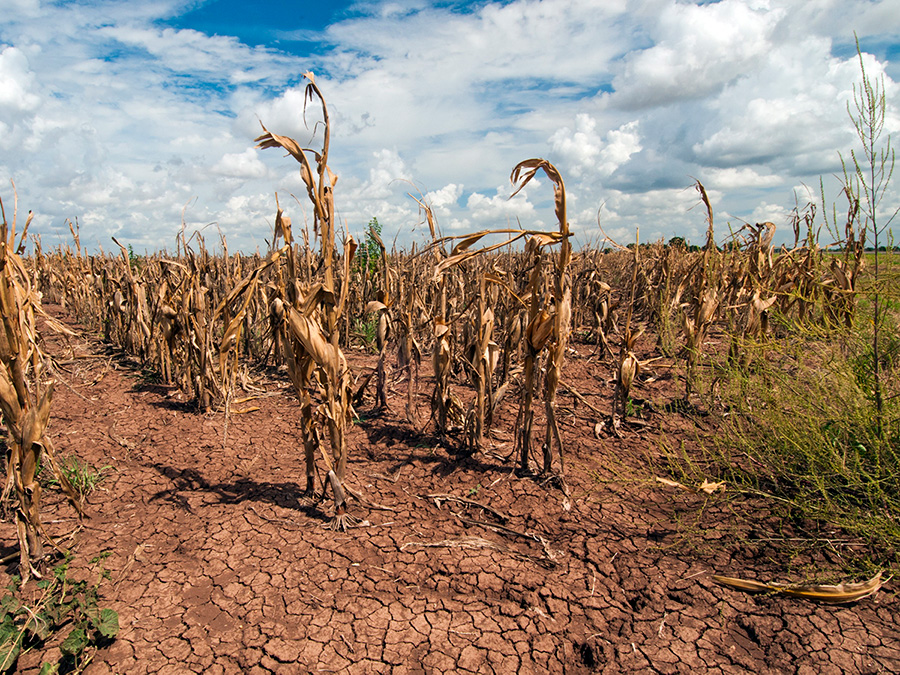UN: Global warming is splintering our food supply
Our agricultural and timber industries account for a third of our greenhouse gas emissions. But drought and other effects of climate change from those emissions make it more challenging to produce enough food. Our future relies on a shift to more sustainable agriculture. (Photo by Bob Nichols/U.S. Department of Agriculture: CC BY-NC 2.0.)
The dwindling breadbasket
Imagine your grocery store. What do you see? Lettuce misted with water? Onions piled high in bins? Fridges full of eggs, cold cuts and more cheese than you could eat in a lifetime?
What you don't see is the trucks, tractors, warehouses and work that got those products onto the shelves. It's easy to overlook the fantastically complicated industry that lies behind every trip you take to Hy-Vee. But it won't be so easy to overlook what happens when the food industry starts to run out of food.
That's not a thought experiment. A new report from the United Nations has found that climate change is splintering the global agriculture system; at the same time, agricultural practices are accelerating climate change.
There's a silver lining to that message, though: If we take steps now to improve how we work with our land, we can turn the soil back into an ally.
Farming and climate change
In addition to crops for direct human consumption, farm operators grow plants for fuel (like corn ethanol) and fiber (like cotton), for timber and other industrial uses, not to mention the enormous amount of grain we feed to livestock and poultry.
As currently practiced, industrial-scale farming involves massive applications of fertilizer (a huge source of greenhouse gases) and tillage practices that release soil carbon. Running equipment and shipping food from farms to store shelves emits even more greenhouse gases.
All told, the agriculture and timber industries account for a third of global emissions. More greenhouse gases mean more severe droughts, storms, floods and other hazards that lead to land degradation. These changes mean farming is already becoming more difficult in many parts of the world.
Replicating natural cycles
You didn't come to this site to read bad news, but it's important to acknowledge that the planet is in a state of crisis. What we do with that information is up to us, and a direct response to this land-use emergency is actually underway in Minnesota, though we've only just begun to build momentum.
In a "natural" system, plants provide a net benefit in terms of greenhouse gas reduction: They absorb carbon dioxide, create oxygen and then die and decompose, building up layers of trapped carbon in the soil.
The agriculture industry can get a lot closer to replicating natural cycles by planting cover crops and perennials like Kernza, exploring perennial biofuel options and implementing "no-till" and other sustainable practices.
For our climate, our river and rural communities
The same agricultural practices that reduce greenhouse gases are good for the health of the Mississippi River, which is why FMR advocates that we strengthen state support for them at the Capitol.
They're also good for farm fields. By replicating natural cycles, we not only reduce the amount of fertilizer and other fossil fuel inputs but build healthy, resilient soils that won't get washed away in the heavy rainstorms expected to characterize Minnesota's weather in the years to come. And, conversely, our fields will be able to withstand the equally likely periods of drought.
Just as importantly, making this shift can help farmers in the upper midwest ensure more stable profits. Minnesota farmers were unable to plant over a million acres of cropland this year due to the spring storms, which left fields flooded or otherwise unusable. Much of what did get planted went in relatively late in the growing season, meaning that an early frost could endanger yields even more. Focusing on soil health and year-round living root systems will reduce the risks associated with extreme weather.
As Umair Irfan of Vox.com put it, we can solve multiple problems at the same time. That's good, because we've run out of time to work on them separately.
Join us
Sign up as a River Guardian and we'll email you when there's a chance to support such programs in the Gopher State and otherwise act for the river. Plus you'll be invited to special events like educational happy hours to learn about issues like this.
Read more from The Water Blog.
Learn more about cover crops, perennials like Kernza and perennial biofuels from our partners at Forever Green.
